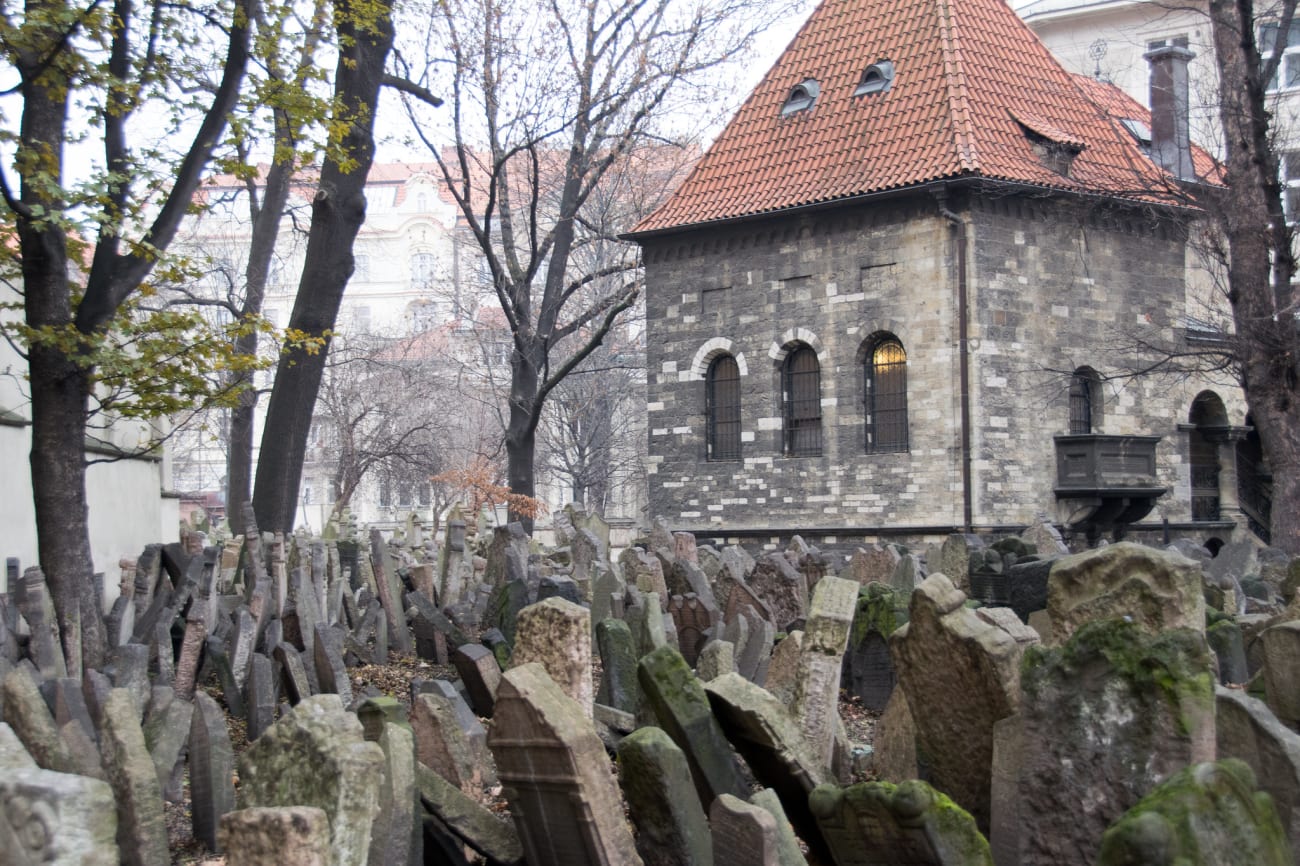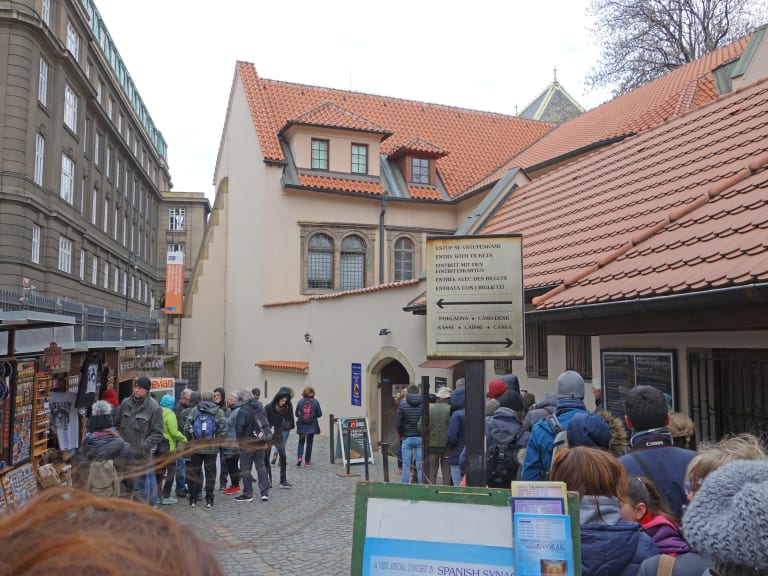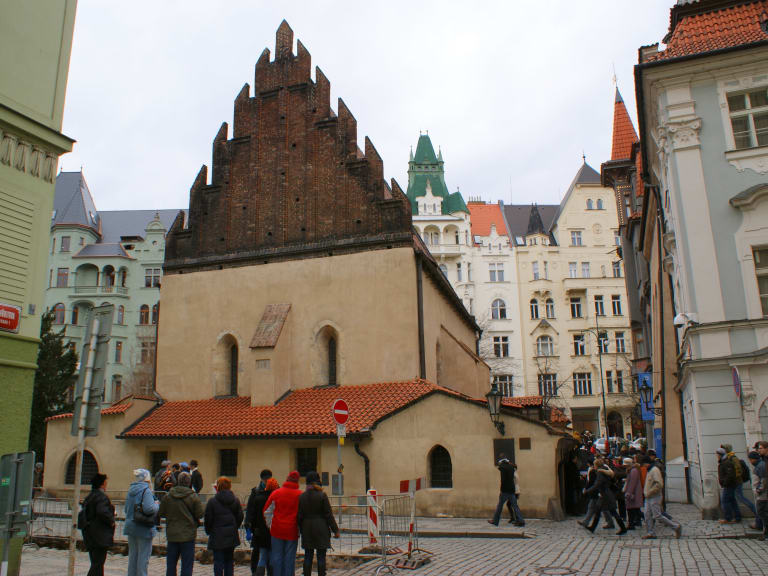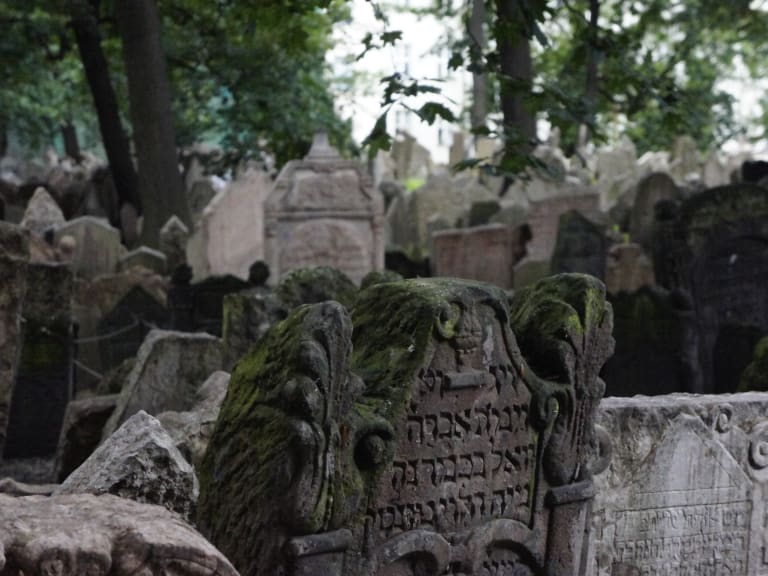10 Things to Do in Jewish Graveyard Prague
Everyone who visits the Jewish cemetery in Prague is impressed and overwhelmed in equal parts. Find out why by knowing what to see and do in one of the most special places in Prague.

Prague Jewish Cemetery | ©Paul Asman
The Jewish Cemetery in Prague is one of the must-see places in Prague. This place has a special atmosphere that impresses with its beauty and overwhelms with its history. Located in the Jewish quarter of the city, this cemetery is one of the most peculiar in the world and also the most crowded in Europe.
In a relatively small area are concentrated thousands of tombstones and more than 100,000 bodies. How is this possible? In this post I discover it along with all the history and what you should see and do if you visit the Jewish cemetery in Prague.
1. Discover why the Jewish cemetery in Prague is one of the most peculiar in the world

The Prague Jewish Cemetery is no ordinary cemetery. There are no large monuments adorning the tombstones, no gardens with flowers cared with care unlike other famous cemeteries in European capitals. Its peculiarity lies in the fact that it is the most overcrowded cemetery in Europe and probably in the world.
For over 300 years it was the only place in Prague where Jews could bury their dead. It was established in the middle of the 15th century in Josefov, the Jewish quarter of Prague, and during all those years some 100,000 people were buried there.
In a relatively small area this seems impossible but there is an explanation, which you can learn about by taking a tour of Prague's Jewish Quarter accompanied by a professional local guide.
2. Visit the illustrious figures buried in the cemetery

Among the 12,000 tombstones in this cemetery are some that belong to illustrious figures of Jewish culture and the history of the city of Prague. They are the most photographed by tourists and the main attractions of the cemetery that you can also visit on the tour of the Jewish Quarter. Some of the most famous people buried in this cemetery are:
- David Oppenheim: a famous rabbi of the city of Prague who lived during the 18th century.
- David Gans: Jewish historian and astronomer, on his tombstone the Star of David was used for the first time as an emblem of the Jewish community.
- Judah Loew: in addition to being a rabbi, he was a Jewish philosopher known as "the Maharal of Prague" who is credited with inventing the legend of the Jewish Golem.
- Mordecai Maisel: one of the leaders of the city of Prague during the 16th century. He built the synagogue of the city that bears his name, which is visited on the tour we have told you about.
3. Learn about the legend of the Prague Golem

In popular Jewish culture there is a legend so well known that it has even appeared on television in "The Simpsons". It is the legend of the Golem of Prague. The creation of this golem, or this legend, is attributed to Judah Loew, yes, the rabbi who was buried in the Jewish cemetery and whose tombstone can be visited on the tour of the Jewish quarter.
Legend has it that this rabbi created the golem out of mud and clay and with the spark of God to protect the inhabitants of the Jewish ghetto from the anti-Semitic attacks they suffered. This mythological being worked if you wrote a task on a piece of paper and put it in his mouth. It was a creature of extraordinary strength but low intelligence. In the cemetery and the Jewish quarter this legend is very present.
Another great thing about taking a tour of the Jewish Quarter is that you can learn more about this story, as well as other stories surrounding Jewish culture.
4. Go to the place where the conspiracy of "The Protocols of Zion" was born.

Prague's Jewish cemetery was the scene of one of the most famous anti-Semitic conspiracies in history: the Protocols of Zion. In 1902 Tsar Nicholas II of Russia and his police service published a pamphlet called "the Protocols of Zion" in which they accused the elders of Zion of meeting in the Jewish cemetery in Prague to conspire and plan world domination.
This fact had much historical relevance, as it served as a pretext to start an anti-Semitic persecution and later served as an inspiration for Nazi ideology. Years later it was shown that these protocols had no basis whatsoever and that it was plagiarized from two fictional novels.
In 2010 this story resurfaced again after the publication of Umberto Eco's novel "The Prague Cemetery", which was based on this conspiracy and which boosted the arrival of tourists to the Jewish cemetery.
5. Walk through the Pinkas Synagogue, the Holocaust memorial

To access the Jewish cemetery we have to go through the Pinkas Synagogue, the second oldest in Prague, dating from 1535, which is part of the Jewish museum where there are temporary exhibitions related to the life of the Jews in Prague and the tragic history of this people.
The synagogue is now a memorial to the Jews and Czechs who were victims of the Nazis. On the walls inside are handwritten the names and surnames of 80,000 Jews who were victims of the Holocaust.
In the same mosque are also kept letters from the prisoners of Terezin, a concentration camp near Prague, which can be visited with an organized excursion to Terezin from Prague.
6. Visit the ceremonial hall of the Jewish cemetery

Next to the Synagogue and in the cemetery is a pseudo-Romanesque building that was once the morgue of the cemetery. It was used as a ceremonial hallfor Jewish burial rites and today is also part of the Jewish museum.
Today it houses a permanent exhibition on the history of the Prague Funeral Society, founded in 1564 by Rabbi Eliezer Ashkenazi, whose headquarters were in the same building.
7. Visit other synagogues in the Jewish Quarter

The entrance to the cemetery costs 12 euros and, although it may seem an expensive price for a visit to the cemetery that we can go in just half an hour, also includes a visit to some of the synagogues of the Jewish quarter. The ones we can see with the same ticket are:
- Spanish Synagogue: so called for its Moorish decoration similar to that found in the Alhambra in Granada.
- Klausen Synagogue: adjacent to the cemetery and its main attraction is its library in which several copies of Hebrew books of great value are preserved.
- Maisel Synagogue: it houses a collection of objects of the Jewish tradition. The original building suffered an inferno so it had to be reformed and changed its style several times until it remained in the neo-Gothic style.
- High Synagogue: it receives this name for its Renaissance style and its two floors. It was for a time part of the town hall of the Jewish quarter.
8. Take the opportunity to visit the Old-New Synagogue

The entrance to the Jewish cemetery does not include access to one of the most important synagogues in Prague and Europe: the Old-New Synagogue. Dating back to 1270, it is the oldest active synagogue in Prague and in all of Europe.
Gothic in style, it was one of the first buildings of this style in the capital of the Czech Republic. It has survived fires, riots and the Jewish holocaust, among other things, and today remains active, welcoming the faithful and tourists.
According to legend, the mythical Golem of Prague rests inert in the attic of this synagogue waiting to be resurrected when the times require it.
9. Visit the Jewish Museum

The Jewish Museum is not a typical museum, in fact it is not located in a single building, but in 8, namely in the synagogues of the Jewish quarter, in the cemetery, in the Roberta Guttmanna Gallery and in a visitor center.
This institution is one of the oldest and most important Jewish museums in the world. It was founded in 1906 and its aim is to document the history of the Jewish people in the Czech Republic, to preserve all valuable objects and documentation and to disseminate the traditions and customs of the Jewish people.
10. Don't try to see Kafka's tomb

Many visitors to the Jewish cemetery come to see the grave of one of literature's most influential writers, Franz Kafka.
It is a very common confusion, since the author is in the Jewish cemetery but not in this one. The overcrowding of the cemetery finally forced to open another one in Prague known as the new Jewish cemetery.
It is here that the author's remains rest and this other cemetery can also be visited and is located in the Žižkov neighborhood in the Czech capital. And if you are really interested in learning more about the life of the writer in the capital I recommend you to book a Franz Kafka tour in Prague.
